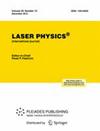通过非赫米提操作提高相关振幅阻尼信道量子密集编码的容量
IF 1.1
4区 物理与天体物理
Q4 OPTICS
引用次数: 0
摘要
利用非厄米运算方法,提出了一种保护和增强量子密集编码免受相关振幅阻尼(AD)退相干影响的方案。与无记忆AD通道的结果相比,我们发现记忆效应在抑制量子密集编码猝死中发挥了重要作用。此外,我们发现使用非厄米运算可以有效地增强受损的量子密集编码。此外,利用最优非厄米运算可以检测量子密集编码的冻结现象。本文章由计算机程序翻译,如有差异,请以英文原文为准。
Enhancing the capacity of quantum dense coding from correlated amplitude damping channel via non-Hermitian operation
Using the non-Hermitian operation approach, we propose a scheme to protect and enhance quantum dense coding from correlated amplitude damping (AD) decoherence. In contrast to the results of memoryless AD channel, we show that the memory effects play a significant role in the suppression of quantum dense coding sudden death. Moreover, we find that the damaged quantum dense coding can be effectively enhanced by using the non-Hermitian operation. Furthermore, the freezing phenomenon of quantum dense coding can be detected by using the optimal non-Hermitian operation.
求助全文
通过发布文献求助,成功后即可免费获取论文全文。
去求助
来源期刊

Laser Physics
物理-光学
CiteScore
2.60
自引率
8.30%
发文量
127
审稿时长
2.2 months
期刊介绍:
Laser Physics offers a comprehensive view of theoretical and experimental laser research and applications. Articles cover every aspect of modern laser physics and quantum electronics, emphasizing physical effects in various media (solid, gaseous, liquid) leading to the generation of laser radiation; peculiarities of propagation of laser radiation; problems involving impact of laser radiation on various substances and the emerging physical effects, including coherent ones; the applied use of lasers and laser spectroscopy; the processing and storage of information; and more.
The full list of subject areas covered is as follows:
-physics of lasers-
fibre optics and fibre lasers-
quantum optics and quantum information science-
ultrafast optics and strong-field physics-
nonlinear optics-
physics of cold trapped atoms-
laser methods in chemistry, biology, medicine and ecology-
laser spectroscopy-
novel laser materials and lasers-
optics of nanomaterials-
interaction of laser radiation with matter-
laser interaction with solids-
photonics
 求助内容:
求助内容: 应助结果提醒方式:
应助结果提醒方式:


